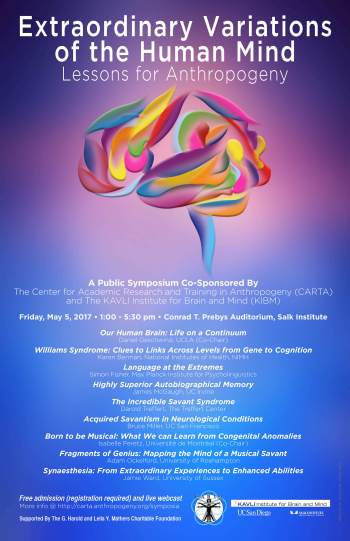Extraordinary Variations of the Human Mind: Lessons for Anthropogeny
Daniel Geschwind, University of California, Los Angeles
Isabelle Peretz, BRAMS, Université de Montréal
Co-sponsored by the Center for Academic Research and Training in Anthropogeny (CARTA) and the Kavli Institute for Brain and Mind (KIBM)
The human mind is one of the features that makes our species unusual, and any narrative of our origins must include explanations for how our mental facilities were generated by genetic and cultural evolutionary processes. Comparative studies with the minds of other species and direct studies of how the typical human brain creates the mind are valuable approaches. However, many useful clues can also be gleaned from studying extraordinary variations of the human mind. This symposium brings together experts who have pursued in-depth explorations of some of these variations.
Media for each talk can be played by clicking on icons in the table below, or by clicking on the individual talk titles below and then the attachment file at the bottom of the page.
| Speakers | Media | Session |
|---|---|---|
 Fred Gage |
|
Welcome |
 Daniel Geschwind |
|
Our Brains: Life on a Continuum |
 Karen Berman |
|
From Genes to Neural Circuits to Behavior & Back Again: Neurogenetic Mechanisms in Williams Syndrome Individuals with Williams syndrome, a fascinating and rare neurogenetic, developmental condition, have only one copy of approximately 25 genes on chromosome 7, instead of the typical, expected two copies (i.e., a “hemideletion”). People with Williams syndrome have a unique profile of striking behavioral features: remarkable hypersociability combined with differential impact on cognitive functions—some mildly affected while others, particularly visuospatial construction, are severely impaired.... read more |
 Simon Fisher |
|
Language at the Extremes The rise of molecular technologies yields exciting new routes for studying the biological foundations of human traits. In particular, researchers have begun to identify genes implicated in unusual disruptions of speech and language skills. My talk will show how genetic studies of language at the extremes can provide powerful entry points into critical neural pathways, using FOXP2 as an example. Rare mutations of this gene cause problems with learning to sequence mouth movements during speech,... read more |
 James McGaugh |
|
Highly Superior Autobiographical Memory Recent research has identified individuals who have exceptionally strong memories of personal experiences and public events. They are able to recall their activities for most of the days of their lives, after the age of 8 or 10, as well as the days and dates of prominent public events. The presentation will review some of the findings of studies of the memory ability of these individuals and discuss some conceptual and neurobiological implications. |
 Darold Treffert |
|
The Incredible Savant Syndrome Savant Syndrome is a rare but remarkable condition in which persons with some underlying brain condition, often but not always autism, have some extraordinary islands of ability which stand in stark, jarring contrast to overall limitations. While most cases are congenital and apparent in childhood, recent cases of acquired savant syndrome in which ordinary persons suddenly develop extraordinary musical, artistic, mathematical or memory abilities following head injury, dementia or other CNS... read more |
 Bruce Miller |
|
Acquired Savantism in Neurological Conditions Visual artistic creativity has been a continual component of human life from the earliest days. Patients with neurodegenerative disease have shown both increased and novel artistic creativity in the face of disease. In Alzheimer’s disease (AD), where the posterior default mode network atrophies, the decline in visuospatial skills tends to lead to more abstract representation and muted color choices. William Utermohlen’s self-portrait series illustrates this progression. On the other hand,... read more |
 Isabelle Peretz |
|
Born to be Musical: What We can Learn from Congenital Anomalies Congenital anomalies provide a natural experiment—a rare chance to examine the biological basis of musicality by tracing causal links between genes, environment, brain, and behavior. Significant advances have been made on the neurobiology of musicality by studying individuals who were born with severe music-specific disorders. This condition is refered to as congenital amusia (or tone-deafness) and represents the low end of the spectrum. In contrast, at the other extreme of the spectrum, few... read more |
 Adam Ockelford |
|
Fragments of Genius: Mapping the Mind of a Musical Savant This talk summarizes the findings from a series of experiments undertaken over a number of years with the prodigious musical savant Derek Paravicini. These sought to map his perceptual and cognitive musical abilities with some precision; to identify the strategies he uses in learning new pieces, in re-creating them and in creating new material through improvisation; and to compare these abilities and strategies with those of advanced neurotypical musicians. The research showed that the... read more |
 Jamie Ward |
|
Synaesthesia: From Extraordinary Experiences to Enhanced Abilities People with synaesthesia experience the ordinary world in extraordinary ways: words may have tastes, and music is an audio-visual spectacle. Everybody knows someone with synaesthesia (it affects a few percent of the population) but you may not know who has it because their extraordinary inner world is privately experienced and, to a synaesthete, it is the only reality they know (and so is perfectly ordinary to them!). Having synaesthesia is linked to certain cognitive advantages and this is the... read more |
 Daniel Geschwind  Isabelle Peretz  All Speakers |
|
Question and Answer Session, Closing Remarks |
| Attachment | Size |
|---|---|
| 1.44 MB | |
| 1.66 MB | |
| 140.72 KB | |
| 153.2 KB |
If you enjoy this event, please consider supporting CARTA's quest to explore and explain the human phenomenon.


